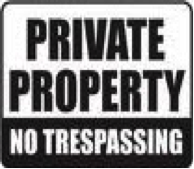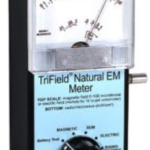 1) If you are going to an abandoned location ASK PERMISSION. Find who owns the property and obtain the proper authorization to be on the premises.
1) If you are going to an abandoned location ASK PERMISSION. Find who owns the property and obtain the proper authorization to be on the premises.
Trespassing is a punishable offense, even for a ghost hunter. If the building is dilapidated or condemned… there’s a very good chance you could be seriously hurt from the condition of the floors or stairways.
2) Don’t ever go alone. If you are not part of an actual paranormal team then take several trustworthy friends with you. Not only is it safer, it provides witnesses for verification of any potential activity. There should be a password that each member knows in case an investigation needs to be ended abruptly. That way if something does happen, there isn’t a lot of panicking and ruining of evidence.
3) If this is your own home or one of an individual, make sure everything about the activity has been documented. Interviews need to be done with all parties involved in the investigation. Everything in these time frames should be written down, including everyday happenings, causes of stress for whoever is living in the home, weather… anything that can be written down should be. This will help establish patterns and possibly find other causes for events that seem paranormal. If it is someone else’s home make sure extensive questions are asked and notes taken of any potential areas to focus on.
4) Do your research. Paranormal teams each have their own approach to researching the history of the home or property. Some prefer to do the research after the physical investigation is done… some prefer before. Whatever you decide to do, the best place to begin researching a property is the local library by looking at city directories. From there, going to the city hall and local newspaper offices can yield more information. County records will also give property information about who and what was there before. If you are investigating a famous haunted location, there will be many legends that are easily found… but legends are often full of misconceptions. Find out the factual history, and in doing so, make note of any “grain of truth” to the stories about the place.
5) Get the proper equipment… and learn how to use it. You can have the most top of the line cameras, video equipment and recording devices, but if you don’t educate yourself on how to properly operate them, your evidence will be faulty. Learn about what settings cameras and video equipment need to be on and make sure the equipment is clean. When recording audio, announce any noises that are made by natural causes. Test and retest the equipment, and always make sure there are plenty of batteries on hand.
Source link





